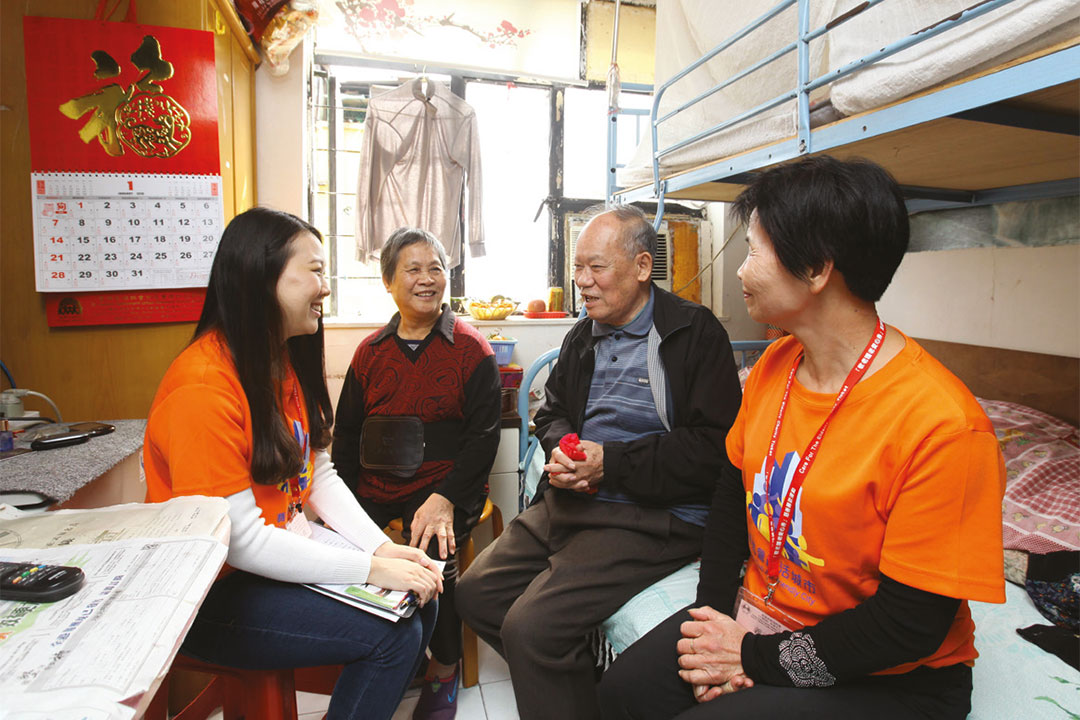THRIVING WITH AGE

The Jockey Club Age-friendly City Project helps build Hong Kong into a city that can cater to the needs of all ages
According to the city’s Census and Statistics Department, the proportion of elderly persons aged 65 and over in the total population rose from 13% in 2011 to 20% in 2021. By 2040, about one in three people in Hong Kong will be elderly.
Over the years, the Club has initiated and supported a variety of projects that enhance the quality of life for people as they age. One example is the Jockey Club Age-friendly City Project (JCAFC Project), which was initiated by The Hong Kong Jockey Club Charities Trust in 2015 and aims to shape Hong Kong into an age-friendly city that caters to the needs of a changing demographic.
One of the project’s beneficiaries is Lee Suk-yin, a 67-year-old retiree who has lived in Wan Chai for most of her life. She is the primary carer for a wheelchair-bound family member and takes her to the hospital and around the neighbourhood on a regular basis. However, the lack of information on barrier-free routes and facilities around Wan Chai has always posed a challenge.
Since Suk-yin became a JCAFC Project ambassador in 2021, she and her peers have explored how to make Wan Chai more age-friendly. They conducted field research around the district and mapped out four barrier-free routes that are convenient for elderly people and wheelchair users, including a pathway between Wan Chai MTR Station and Ruttonjee Hospital that is equipped with lifts and ramps. They also helped promote these barrier-free routes to the community with pamphlets and the help of social workers. Through her role as a project ambassador, she realised that everyone can serve the community and share their experiences with others, regardless of their age.
Across Hong Kong, many elderly people like Suk-yin have been recruited and trained by JCAFC Project’s partners, such as the Asia-Pacific Institute of Ageing Studies at Lingnan University, to become project ambassadors. The project’s bottom-up, district-based approach to implementing its programmes best addresses the needs of the neighbourhood’s inhabitants. So far, it has organised more than 140 programmes across the 18 districts of Hong Kong.
According to the World Health Organization (WHO), an age-friendly city encourages active ageing by optimising opportunities for health, participation and security to enhance the quality of life as people age. Informed by the eight domains of an age-friendly city identified by the WHO as determinants of active ageing, the JCAFC Project works to assess the age-friendliness of each district, build momentum in developing an age-friendly community, recommend a framework for districts to continuously improve their features for the well-being of elderly people, and increase public awareness to encourage community participation in building an age-friendly Hong Kong. The eight domains are outdoor spaces and buildings, transportation, housing, social participation, respect and social inclusion, civic participation and employment, communication and information, as well as community support and health services.
The Infusion Education Programme, organised by The Hong Kong Polytechnic University (PolyU) Institute of Active Ageing, also helps build an age-friendly city with the involvement of JCAFC Project ambassadors. Its objective is to facilitate exchange between ambassadors and university students, which helps foster an age-friendly mindset in all parties. Project ambassador Antonio Cheah and PolyU student Sarah Iu were both participants in a workshop as part of the MSc in Nutrition and Healthy Ageing courses, which integrates knowledge of nutrition and gerontology to help promote a healthy diet among elderly people.
“Through participating in this programme, the students shared a lot of health-related information with me. They also gave me useful health knowledge and advice,” says Antonio.
Meanwhile, the programme has allowed students like Sarah to communicate more with elderly people. She says, “I now have a deeper understanding of their needs, which is something that I can’t learn from textbooks. Moreover, the experience has better prepared me for a career in caring for the elderly.”
Positive Ageing & Elderly Care is one of the focus areas of the Club’s charities strategy. Like all its charity donations, our support for this project is made possible by its unique integrated business model, through which racing and wagering generate tax and charity support for the community. We will continue to support this and other similar initiatives for the betterment of our society.

